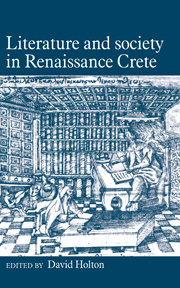Book contents
10 - Literature and popular tradition
Published online by Cambridge University Press: 14 October 2009
Summary
It is the purpose of this chapter to re-examine the role of popular tradition in the composition, transmission and reception of some of the Cretan literary texts written between the fifteenth and the seventeenth centuries. The objectives, necessarily limited, will be: first, to give a brief review of the debate so far, and to situate it within its historical and intellectual contexts; second, to attempt a redefinition of the terms most frequently used, as well as of their underlying assumptions, in order to work out new methods and approaches which will draw on the considerable recent research into western medieval and Renaissance culture; third, two texts will be analysed, not with a view to identifying isolated ‘literary’ and ‘popular’ elements, but so as to suggest how certain cultural and historical factors operated in favour of new combinations — oral and literary, sacred and secular, Byzantine and Italian — which challenged traditional stereotypes and led to the creation of a qualitatively different kind of literary text; finally, the principles and methods applied will be summarised, in the hope that they may provide a basis for a systematic study of Cretan Renaissance literature as a whole.
The interpretation and reception of Cretan literature: an overview
A review of the transmission and reception of Cretan literature reveals that controversy has always tended to centre around its ‘popular’ versus ‘literary’ character.
- Type
- Chapter
- Information
- Literature and Society in Renaissance Crete , pp. 239 - 274Publisher: Cambridge University PressPrint publication year: 1991
- 2
- Cited by



